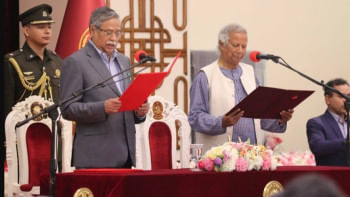'Promote hygiene practices in slums to prevent diarrhoea'
Speakers at a workshop yesterday underscored the need for use of sodium hypochlorite solution to purify water and promote hygiene practices in slum areas in order to prevent diarrhoeal diseases.
Most slums in the city lack access to safe drinking water, resulting in a high incidence of water-borne diseases among the children, they said, adding that the children attacked by the most common water contaminant, a bacteria known as salmonella, remain sick round the year.
Quoting an official estimate, they also said the people spend about Tk 500 crore a year on the treatment of diarrhoeal and other water-borne diseases in the country.
Dushtha Shashthya Kendra (DSK) organised the workshop on 'Safe water system management' in the city.
Sponsored by Plan International, Bangladesh, the workshop presented findings of a project titled 'Combating diarrhoea with household-based water treatment and storage system'.
To address the drinking water problem, the DSK in collaboration with the World Health Organisation (WHO) and the Centre for Disease Control and Prevention, (CDC), USA, launched a pilot project in July 2004 to increase knowledge about hygiene practices at household level in slum areas in Bauniabad close to Zia International Airport.
"Proper hand washing practice gives additional benefits by reducing diarrhoea episodes and pneumonia attack by 50 per cent and I strongly suggest taking such programmes forward for benefit of others as well," said Kallori Pavani, a medical epidemiologist from CDC.
Toufiqul Arif, acting chief of WHO Environmental Health, said, "Sodium hypochlorite has very high acceptance rate across the globe. During the recent floods in the country, sodium hypochlorite solution was given out to the affected people to disinfect contaminated water, which saved thousands of lives."
Dibalok Singha, executive director of DSK, Edward Thomas, country director of Plan International, Bangladesh, Khandaker Zakir Hossain, country representative of Water Aid, Pual Edwards, chief of Water and Environmental Sanitation, Unicef, Bangladesh, Begum Meherunnesa, DCC ward commissioner, and Khaleda Akhter, representative of the Bauniabad slum-dwellers, also spoke.
Dr Masudul Quader, director of DSK, presented a keynote paper while Barrister Shafique Ahmed, president of DSK, chaired the workshop.

 For all latest news, follow The Daily Star's Google News channel.
For all latest news, follow The Daily Star's Google News channel. 



Comments